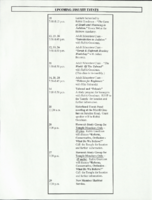Search the Special Collections and Archives Portal
Search Results
Ernie W. and Lucille Marleau Cragin Photograph Collection
Identifier
Abstract
The Ernie W. and Lucille Marleau Cragin Photograph Collection contains photographic prints, negatives, and slides depicting early Las Vegas and Boulder City, Nevada events, buildings, and people between approximately 1900 and 1950.
Archival Collection
Bob Weinstein Papers on Compulsive Gambling
Identifier
Abstract
The Bob Weinstein Papers on Compulsive Gambling (1945-2024) contain pamphlets, brochures, conference packets, promotional material, correspondence, and ephemera related to Weinstein's involvement in Gamblers Anonymous (G.A.). The collection contains G.A. recovery resources, workshop and training booklets, and meeting minutes and correspondence from Weinstein's time on the G.A. International Board of Trustees. Also contained in the collection are copies of correspondence from Jim W. (founder of Gamblers Anonymous) to Bill W. (a founder of Alcoholics Anonymous) and many books and other publications related to compulsive gambling.
Archival Collection
Regional subject files, 1859, 1908, 1970-2015
Level of Description
Scope and Contents
The regional subject files include materials collected by anthropologist Katherine Spilde about Native American gaming, Native American communities in the United States, and the US and international gaming industries. The materials date from 1859 to 2015, with the bulk of materials dating from 1990 to 2010. Materials dating from the nineteenth and early twentieth centuries are a reproduction of a federal treaty and an ethnohistorical essay. The majority of the materials document Native American gaming following the passage of the 1988 Indian Gaming Regulatory Act. The papers include research and subject files created by Dr. Spilde during her employment with the National Gambling Impact Study Commission (NGISC), National Indian Gaming Association (NIGA), and Harvard Project on American Indian Economic Development (HPAIED). The materials document Native American gaming enterprises both on and off reservations, the socioeconomic impact of gaming, the political history of gaming in the US, and international gaming. The series includes socioeconomic reports, testimonies, correspondence, memos, press releases, photographs, audiovisual materials, promotional materials, brochures, fact sheets, summaries, booklets, pamphlets, advertisements, tourism materials, journal articles, legal briefs, legislative documents, court opinions, notes, presentations, conference materials, periodicals, community newspapers, and newspaper articles.
The collection contains documentation on a number of Native American nations, including the Misi-zaaga'iganiing Anishinaabeg (Minnesota Chippewa Tribe, Mille Lacs Band); Gaa-waabaabiganikaag Anishinaabeg (Minnesota Chippewa Tribe, White Earth Band); Forest County Bodéwadmi (Forest County Potawatomi Community); Ho-Chunk Nation of Wisconsin; Mashantucket Pequot Indian Tribe; Mohegan Tribe of Indians; Tulalip Tribes of Washington; Sisseton-Wahpeton Oyate of the Lake Traverse Reservation; Standing Rock Sioux Tribe of North and South Dakota; Mandan, Hidatsa, and Sahnish (Arikara) (Three Affiliated Tribes of the Fort Berthold Reservation, North Dakota); and Mississippi Band of Choctaw Indians. Other communities are also represented in the series, but to a lesser extent. In addition to materials about gaming and casinos, Dr. Spilde also collected documents, photographs, and audiovisual materials about Native American culture in general. The series documents regional and national trends in Native American gaming, and the greater gaming industry. Materials trace federal and state relationships with individual Native American nations, specifically concerning gaming enterprises.
Archival Collection
Pagination
- Previous page ‹‹
- Page 2
Archival Component

Magdalena Martinez oral history interview: transcript
Date
Archival Collection
Description
Oral history interview with Magdalena Martinez conducted by Monserrath Hernandez and Barbara Tabach on April 4, 2019 for the Latinx Voices of Southern Nevada Oral History Project. In this interview, Magdalena Martinez recalls her childhood and growing up in Los Angeles, California. Martinez's parents are from Durango, Mexico, and immigrated to the United States in the 1970s. Martinez describes the generational differences that the women in her family faced and how the feminist movement of the 1970s did not resonate with women of color. Her family moved to Las Vegas in 1986 where she attended Bishop Gorman High School. After transferring to the University of Nevada, Las Vegas (UNLV) from community college and joining a student organization that would later become Student Organization of Latinxs, she became an early member of the Latino Youth Leadership Conference (LYLC) sponsored by the Latin Chamber of Commerce. Martinez describes how the LYLC has evolved over the years, and talks about her role in those changes. She discusses past work for CSN, NSHE, and currently is the Director of Education Programs with the Lincy Institute.
Text

Jay Pleggenkuhle and Daniel Perez oral history interview: transcript
Date
Archival Collection
Description
Oral history interview with Jay Pleggenkuhle and Daniel Perez conducted by Claytee D. White on July 18, 2018 for the Remembering 1 October Oral History Project. In this interview, Jay and Daniel describe their business partnership in a landscaping venture. After the tragic event on October 1, 2017, the pair wanted to do something for the city of Las Vegas, Nevada. Perez suggested that Pleggenkuhle call officials at the City of Las Vegas and propose a healing garden. The City offered a site and the work began, and within 72 hours, a design materialized, volunteers appeared, materials arrived, and the work began. On Friday, the official dedication was held. Pleggenkuhle and Perez share stories of the garden's construction, the generosity of the human spirit, love, and giving back as a city mourns. The two recall that the main oak tree, the Tree of Life, centers the garden and the 58 smaller trees anchor the garden.
Text

Carole Fisher oral history interview: transcript
Date
Archival Collection
Description
Oral history interview with Carole Fisher conducted by Barbara Tabach on December 14, 2016 for the Southern Nevada Jewish Heritage Project. In this interview, Fisher discusses her family background and moving to Las Vegas, Nevada in 1979. Fisher talks about Nathan Adelson Hospice, programs that they provide for the Las Vegas senior community, and the increase of hospices in Las Vegas. She describes how Nathan Adelson Hospice is able to provide care for uninsured people, fundraising events they organize, and how their hospice differs from traditional hospital care. Lastly, Fisher discusses the significance of death in the Jewish religion.
Text
Olivia Diaz (City of Las Vegas Councilwoman) oral history interview conducted by Magdalena Martinez: transcript
Date
Archival Collection
Description
From the Lincy Institute "Perspectives from the COVID-19 Pandemic" Oral History Project (MS-01178) -- Elected official interviews file.
Text

Minutes from Temple Beth Sholom Board of Directors meetings, 1998
Date
Archival Collection
Description
Meeting minutes include reports from committees of the board, correspondence, and balance sheets.
Text

David Becker oral history interview: transcript
Date
Archival Collection
Description
Oral history interview with David Becker conducted by Claytee D. White and Barbara Tabach on May 15, 2018 for the Remembering 1 October Oral History Project. In this interview, Becker recalls being on a three-day assignment at the Route 91 Harvest Country Music Festival across from the Mandalay Bay Resort in Las Vegas, Nevada. Thinking the gunfire was produced by malfunctioning equipment, he took photos of the scattering crowd. Moments later, in a now silent venue, he realized he captured a horrific massacre. Becker recalls photographing people leaving the venue as they performed acts of heroism, helping the fallen or the slow to reach safety. He discusses how difficult it is to comprehend the acts of that night, and how his photojournalist instincts allowed him to capture such devastating images.
Text
Tick Segerblom (Clark County Commisioner) oral history interview conducted by Magdalena Martinez and Taylor Cummnings: transcript
Date
Archival Collection
Description
From the Lincy Institute "Perspectives from the COVID-19 Pandemic" Oral History Project (MS-01178) -- Elected official interviews file.
Text
